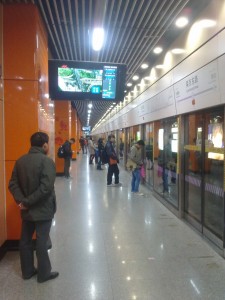Shanghai Street View: Sunsetting Subsidies

Our subway system beneath the streets of Shanghai became just a tad quieter this week, with the official retirement of passes that have allowed elderly riders to use the metro for free for years. Regular users of our metro will know I’m referring to disappearance of the voice that barks out the words jinglaoka every time a user of one of these free passes enters or exits through the turnstiles of the subway.
That loud voice, presumably aimed at preventing abuse of the cards, officially went quiet this past Sunday, marking the end of an era for elderly people who could enjoy unlimited free rides during non-peak times. The new policy also eliminated free rides for retirees on our city’s bus system.
I have mixed feelings about the move, since the original free ride cards are similar to policies in the west designed to assist retired people living on limited incomes. On the one hand, many of these people grew up and worked in China during the socialist era, and thus have very limited savings and pensions and really do need these subsidies just to function in daily life.
But the policy’s retirement also reflects the very real fact that our public transport system is quite overburdened and in need of relief. That situation is only getting worse as Shanghai’s population continues to grow, and more people rely on the system after moving to distant suburbs to escape soaring housing prices in the city center. What’s more, the old system of free rides for retirees was reportedly getting abused, with young people sometimes illegally using cards from their elderly relatives to ride for free.
At a broader level, this story reflects China’s difficult move from a society where everything from rents to food and bus rides was highly subsidized by the government, to the current market-oriented system. People in their 60s and older have been some of the biggest victims of this changeover, since many spent most of their careers working in the old subsidized system that included relatively low wages and implied guarantees of continued state support after they retired.
For years, one of those bedrock forms of support was the free bus and subway passes, or jinglaoka, whose name roughly translates to “card of respect for the elderly.” I have to admit that every time I hear the subway turnstiles blurt out those words to signify someone has just used a card, I turn to see if the person is really a retiree, or perhaps a younger person illegally using a card.
US Handicapped Passes
That kind of privilege for certain groups also exists in my native US, where handicapped people get similar passes that allow them to park their cars in spaces that are usually far more convenient than those available to everyone else. In one particular scandal during my years living in Los Angeles in the 1990s, members of the UCLA football were exposed for illegally using such passes to make their lives more convenient.
While I occasionally see such illegal use of these free transport passes in Shanghai, the vast majority of times that I look an elderly person is really using the card. Those cards were previously available for any Shanghai resident over 70, and an average of 412,600 free rides were logged each day in 2015, reflecting the program’s popularity.
But the city decided all those free travelers were putting too much pressure on the bus and subway systems, leading to its decision to cancel the program as of this week. That means that elderly residents now have to pay the fares just like everyone else, though they will receive some new monthly government subsidies to help offset that burden.
This does seem like a good compromise, since this kind of unlimited free pass does tend to lead to inefficient use of the system. That’s because someone with such a pass might decide to make 2 or 3 trips to do errands during the day since there’s no incentive to be more efficient, even though he could really accomplish everything with a single trip. I suspect that many elderly people who previously depended on the cards will easily make the adjustment, forcing them to accomplish all their tasks more efficiently while also making our buses and subways just a little less crowded.
Anyone who regularly uses public transport knows just how badly overtaxed the system is now, especially during peak hours. The situation is unlikely to improve anytime soon as more people become commuters and abandon the older system where people’s state-supplied homes were often quite close to their state-owned employers. Retirement of free passes for the elderly could provide some temporary relief for the current state of congestion, though I expect that few people will notice any major improvement in crowd levels in our public transportation system.
